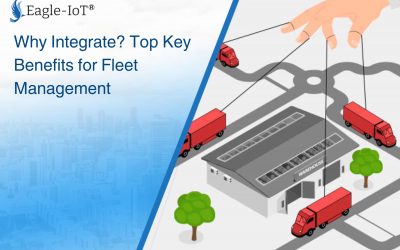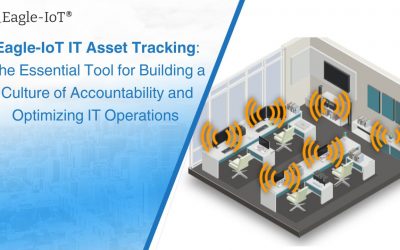- All
- Fleet Management and Telematics
- Sustainability and Green Technologies
- General Industry News and Trends
- Internet of Things (IoT) and Smart Technologies
The Power of Live Tracking: A Closer Look at Real-Time Visibility with Eagle-IoT
The Rising Need for Real-Time Visibility In the world of fleet operations, the margin for error is shrinking. Today’s businesses—whether in logistics, construction, healthcare, or public services—must operate with agility and clarity. The ability to monitor moving...
Elevating Fleet Safety with Eagle-IoT: A Data-Driven Approach
Fleet safety is more than just a set of rules—it’s a balance of strategy, psychology, and technology. The best fleets don’t just react to accidents; they use data-driven insights, real-time monitoring, and positive reinforcement to prevent incidents before they...
Winning Driver Engagement: The Heart of a Safer Fleet
Fleet safety isn't just a policy—it's a culture. While technologies, procedures, and regulations form the backbone of a safety program, the real difference-maker lies in the people behind the wheel. Building a culture of safety starts with engaging drivers, winning...
The Future of Fleet Management: Key Insights from the 2025 Fleet Technology Trends Report
The transportation industry is evolving rapidly, with fleet technology playing a crucial role in optimizing operations, enhancing safety, and improving efficiency. The 2025 Fleet Technology Trends Report highlights how data-driven decision-making, artificial...
Why Integrate? Top Key Benefits for Fleet Management
Managing a fleet is no easy task. Whether you're tracking vehicles, managing drivers, or ensuring compliance, having the right tools makes all the difference. Eagle-IoT delivers—a powerful, all-in-one telematics solution designed to help fleet managers gain...
How AI is Transforming Fleet Management for Small and Medium-Sized Businesses
Artificial Intelligence (AI) is revolutionizing the fleet management industry, offering automation, efficiency, and enhanced safety. While large enterprises often have dedicated fleet managers, small and medium-sized businesses (SMBs) typically lack the resources to...
Unlock Sustainable Growth with Streamlined Logistics
The Challenges of Modern Fleet Management In today’s fast-paced logistics industry, fleet managers face an uphill battle. Rising fuel costs, inefficient route planning, vehicle downtime, and fuel theft can drain resources and impact profitability. Regulatory...
Safety, Compliance, & Efficiency: Level Up Your Bus Fleet for Aramco Compliance
Technology is revolutionizing bus fleet operations, shifting the paradigm from manual processes and intuition to data-driven insights and automation. Advanced technologies are transforming fleets to be safer, more efficient, and sustainable. Safety First: Protecting...
Understanding Underperformance in Fleet Maintenance
Fleet management revolves around maximizing operational efficiency, minimizing costs, and ensuring the longevity of assets. However, amidst the glaring challenge of downtime, there lies a more insidious and often overlooked adversary: underperformance. This silent...
The Power of Live Tracking: A Closer Look at Real-Time Visibility with Eagle-IoT
The Rising Need for Real-Time Visibility In the world of fleet operations, the margin for error is shrinking. Today’s businesses—whether in logistics, construction, healthcare, or public services—must operate with agility and clarity. The ability to monitor moving...
Elevating Fleet Safety with Eagle-IoT: A Data-Driven Approach
Fleet safety is more than just a set of rules—it’s a balance of strategy, psychology, and technology. The best fleets don’t just react to accidents; they use data-driven insights, real-time monitoring, and positive reinforcement to prevent incidents before they...
Winning Driver Engagement: The Heart of a Safer Fleet
Fleet safety isn't just a policy—it's a culture. While technologies, procedures, and regulations form the backbone of a safety program, the real difference-maker lies in the people behind the wheel. Building a culture of safety starts with engaging drivers, winning...
The Future of Fleet Management: Key Insights from the 2025 Fleet Technology Trends Report
The transportation industry is evolving rapidly, with fleet technology playing a crucial role in optimizing operations, enhancing safety, and improving efficiency. The 2025 Fleet Technology Trends Report highlights how data-driven decision-making, artificial...
Why Integrate? Top Key Benefits for Fleet Management
Managing a fleet is no easy task. Whether you're tracking vehicles, managing drivers, or ensuring compliance, having the right tools makes all the difference. Eagle-IoT delivers—a powerful, all-in-one telematics solution designed to help fleet managers gain...
How AI is Transforming Fleet Management for Small and Medium-Sized Businesses
Artificial Intelligence (AI) is revolutionizing the fleet management industry, offering automation, efficiency, and enhanced safety. While large enterprises often have dedicated fleet managers, small and medium-sized businesses (SMBs) typically lack the resources to...
Unlock Sustainable Growth with Streamlined Logistics
The Challenges of Modern Fleet Management In today’s fast-paced logistics industry, fleet managers face an uphill battle. Rising fuel costs, inefficient route planning, vehicle downtime, and fuel theft can drain resources and impact profitability. Regulatory...
Safety, Compliance, & Efficiency: Level Up Your Bus Fleet for Aramco Compliance
Technology is revolutionizing bus fleet operations, shifting the paradigm from manual processes and intuition to data-driven insights and automation. Advanced technologies are transforming fleets to be safer, more efficient, and sustainable. Safety First: Protecting...
Understanding Underperformance in Fleet Maintenance
Fleet management revolves around maximizing operational efficiency, minimizing costs, and ensuring the longevity of assets. However, amidst the glaring challenge of downtime, there lies a more insidious and often overlooked adversary: underperformance. This silent...
Driving Towards a Greener Future: What You Need to Know About Saudi Arabia’s Vehicle Registration Changes
Driving Towards a Greener Future: What You Need to Know About Saudi Arabia's Vehicle Registration Changes Saudi Arabia Implements New Annual Fee for Vehicle Registration Based on Fuel Consumption Saudi Arabia implemented the new annual fee for Vehicle Registration...
From Planning to Implementation: Steps to Building a Successful Green Fleet Program
From Planning to Implementation: Steps to Building a Successful Green Fleet Program The transportation industry is a major contributor to climate change, accounting for about 28% of global greenhouse gas emissions. As fleets strive to reduce their carbon footprint and...
Know what your fleet’s carbon footprint is!
Know what your fleet’s carbon footprint is! Environmental sustainability initiatives are a new buzz around the globe with an objective to lessen the impact of your business on the planet. New legislations are introduced internationally to combat offsetting (carbon...
Carbon emissions of vehicles as key driver of Global warming, says NASA
Carbon emissions of vehicles as key driver of Global warming, says NASA New research headed by NASA’s Goddard Institute for Space Studies (GISS) in New York City’s Nadine Unger, focuses on a more intuitive approach by examining climate impacts by the economic sector...
Cyberthreats to Connected Cars: Stop at the API
Cyberthreats to Connected Cars: Stop at the API Our cars are evolving into rolling tech marvels, offering comfort, convenience, and a glimpse of the self-driving future. However, this technological leap comes with a hidden danger: a growing vulnerability to...
AI Transforms Google Maps: 6 Features for Smarter Navigation
AI Transforms Google Maps: 6 Features for Smarter Navigation Gone are the days of paper maps and frustrating route planning for fleet managers. Google AI powered Mapping technology has exponentially ascended, offering real-time directions, immersive street views, and...
TGA Implements Auto Surveillance for Trucks & Buses
TGA Implements Auto Surveillance for Trucks & Buses Saudi Arabia's Transportation Industry Embraces a Digital Future The transformation of Saudi Arabia's transportation industry continues, driven by innovation and a commitment to enhanced safety and efficiency....
Optimize, Extend, Protect: Your Fleet with Eagle-IoT
Optimize, Extend, Protect: Your Fleet with Eagle-IoT Fleet management is a dynamic and demanding task that requires meticulous attention to detail and a proactive approach. Fleet managers are tasked with managing the total cost of ownership across all fleet assets...
Russia-Chinese cooperation: Using GLONASS and BeiDou for peaceful purposes
Russia-Chinese cooperation: Using GLONASS and BeiDou for peaceful purpose On July 26th, Russia passed a law named “On ratification of the agreement between the Government of the Russian Federation and the Government of the People’s Republic of China on cooperation in...
Who gets more distracted: older driver vs. younger driver?
Who gets more distracted: older driver vs. younger driver? According to the latest study conducted by the University of Utah in conjunction with the AAA Foundation for Traffic Safety to find the connection between the rapid increase in technology and older drivers....
Australia raised $10.8 million by planning a network of nanosatellites for IoT applications
Australia raised $10.8 million by planning a network of nanosatellites for IoT applications. Fleet space technologies located in Adelaide, capital of Southern Australia, recently raised $10.8 million by planning a network of nanosatellites for IoT applications. It is...
Revolutionary Trends in AVL Technology: Navigating the Future with Leading Manufacturers
Revolutionary Trends in AVL Technology: Navigating the Future with Leading Manufacturers From cutting-edge wearables and IoT platforms to next-generation Telematics solutions – there’s plenty to discover in this article on the latest GNSS manufacturer trends impacting...
Mercedes-Benz Vans will now allow driver behavior monitoring on all new Sprinter and Vito Toure
Mercedes-Benz Vans will now allow driver behavior monitoring on all new Sprinter and Vito Tourer Mercedes-Benz Vans announced to provide its Mercedes PRO, a connected vehicle service that will allow monitoring driver behavior on all-new Sprinter and Vito Tourer as a...
Time is Money: Why Early Incident Reporting Matters
Accidents are an unfortunate but inevitable part of the landscape. When they occur, the immediacy of your response can have a profound impact on the overall cost and outcome of the incident. Delays in reporting incidents can lead to significant cost implications for...
When Generators Whisper Secrets: How Data Analysis Optimizes Production
When Generators Whisper Secrets: How Data Analysis Optimizes Production The Critical Role of Reliable Generators in Industrial Success Industrial success hinges on the reliable operation of generators. From the colossal presses shaping steel to the delicate equipment...
How IoT Solutions Can Empower Modern Cold Storage Today
How IoT Solutions Can Empower Modern Cold Storage Today Within the intricate network of the global supply chain, cold storage facilities play a vital role. These specialized warehouses ensure the safekeeping and distribution of temperature-sensitive products,...
Get Better Control of Your Hospital Asset Lifecycles: From Inventory Management to Records
The Urgent Need for Effective Hospital Asset Management Never before has the global healthcare system has been put under such huge strain as during a pandemic. With the quick dwindling of resources, hospitals were fighting for critical medical supplies. In the...
Why is it Crucial to Ensure Quality Control in Healthcare Industry?
Why is it crucial to ensure quality control in healthcare industry? Why the Right Conditions Matter: Have you ever wondered, why is it crucial to keep biotechnology and pharmaceutical products under the right ambient conditions? While we are well aware of the fact...
Maximizing Fleet Efficiency: The Power of Preventive Maintenance with Eagle-IoT
Maximizing Fleet Efficiency: The Power of Preventive Maintenance with Eagle-IoT In the fast-paced world of fleet management, where every minute counts, preventing downtime and ensuring the longevity of assets are critical objectives. Fleet managers are increasingly...
Navigate Your Facility with Ease of Eagle-IoT Facility Management Software
Navigate Your Facility with Ease of Eagle-IoT Facility Management Software In the rapidly evolving business landscape, effective facility management (FM) has emerged as an indispensable element for cultivating productive and secure work environments. This...
Elevate Cold Chain Operations with Wireless Temperature Sensors
Elevate Cold Chain Operations with Wireless Temperature Sensors In the ever-evolving landscape of logistics and supply chain management, maintaining the integrity of the cold chain has become a critical factor in ensuring the quality and safety of...
Eagle-IoT IT Asset Tracking: The Essential Tool for Building a Culture of Accountability and Optimizing IT Operations
Elevate your IT operations with Eagle-IoT IT Asset Tracking! Discover real-time monitoring, proactive alerts, and automated audits for unparalleled accuracy and efficiency. Centralized dashboards empower managers to optimize workflows and make informed decisions.
Study Guide linePlan a successful thermal mapping
As per the new guideline issued by Saudi Food and Drug Authority (SFDA), it is mandatory for temperature-controlled facility to have Data-Driven Thermal Analysis to meet the new requirement of Storage Regulatory. In a controlled temperature environment (CTE), temperature fluctuation is far from straightforward. With the implementation of thermal mapping technique, we can stabilize the temperature and humidity in a controlled environment (such as a warehouse, refrigerator, or vehicle). It ensures that your products are kept within the certain temperature range, minimizing the chances of spoilage or damage. Besides this, the study allows to identify any potential hot or cold locations which could possibly jeopardize the temperature-sensitive items.
Ready to talk?
Get in touch to chat with our expert consultants today.































